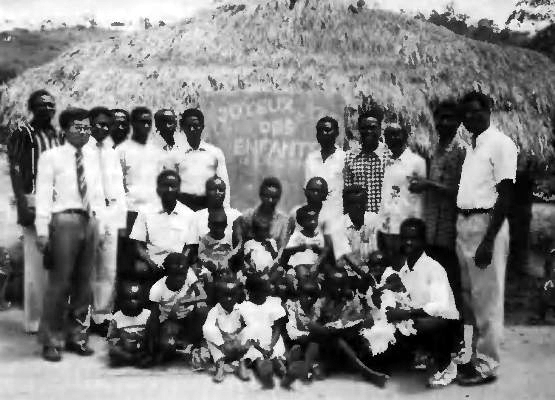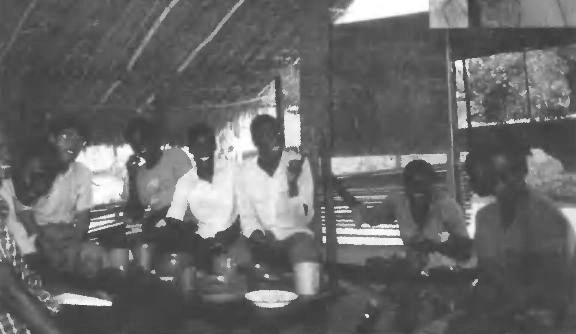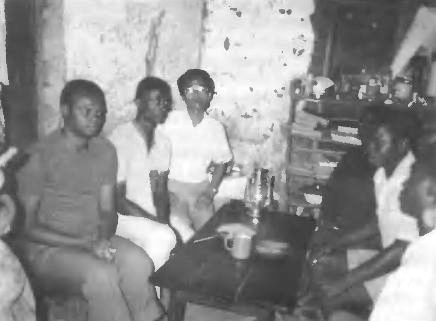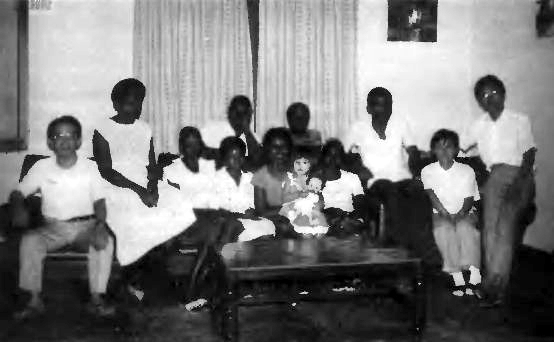![]()
The Words of the Sano Family
|
|
The Words of the Sano Family |

Zairian
members celebrate Children's Day 1986 with members from the Central
African Republic. On the left is Mr. Michihito Sano.
I have worked in many countries during my 13 years as a missionary, such as Burundi, Mauritius, and the Central African Republic. Now I am working in the country of Zaire. The experiences I have had during this period are rich and unforgettable.
Out of all these years, the year 1987 was a very special one for the whole Unification Church, but it was especially profound for me. I had a very bad traffic accident in one of the provinces of Zaire, near the border of the Central African Republic (the CAR), and I had to be carried to the hospital in Bangui, capital city of the CAR. But the French doctor responsible for that hospital judged it impossible to operate upon the broken joint of my leg, so he sent me back to Japan. In Japan, miraculously, I was able to walk again without the help of crutches. I felt as if God had given me another life, so I have redetermined myself to dedicate my life completely to God.
When I first became a missionary in 1975, I had a strong determination to teach the Principle everywhere to everyone. I thought my role would be like that of a professor who teaches mathematics or physics to his students. But after many years of experience, I found that this is not the role of a missionary.
What the people needed me to be was not an excellent teacher of the Principle, but a person who could convey to them the love of True Parents. I found out, finally, that the task for us as missionaries was much more difficult than I had ever imagined.

Brothers
and sisters in Zongo share a simple lunch.
The place I'm working now is a small town in Zaire called Zongo, about 2,000 kilometers from the capital city of Kinshasa. This town has a population of about 18,000 and faces the Ubangi River. There is no airport in Zongo, so in order to get there you have to take a plane from Kinshasa to the nearest town, called Gemena. But that town is still 260 kilometers away from Zongo, and there is no public transportation available. So you have to find a truck in which merchants are transporting their merchandise -- manioc, peanuts, corn, etc. -- to sell in Zongo. Usually they fill the bed of their trucks with these bags, and the passengers have to sit on top of them. Some passengers even carry goats or chickens with them, so the truck becomes like Noah's Ark. Yet the people are always so joyful, and soon all the passengers become friends. They discuss a lot sitting on the top of the bags while the truck is moving -- about politics, business, or daily life -- and sometimes they sing Christian hymns together. I admire very much this aspect of African people -- they always keep a joyful spirit despite the fact that they are living under very difficult conditions.
Although it is only a 260-kilometer drive, it usually takes two or three days to reach Zongo because of the bad conditions on the road. The driver must drive at a speed of 10 to 20 kilometers an hour. There are holes everywhere, and the road becomes very slippery after a rain.
Many times we have to get off the truck and walk, or push the truck out of a hole. The truck sometimes breaks down and we have to wait for it to get fixed. Some trucks have no headlights, and then we are obliged to stop somewhere after dark and pass the night there.
After many such adventures we finally arrive in my town, Zongo. Then the members and the people I know welcome me with an extremely warm heart.
As soon as they see me, they run toward me, shaking my hand or just hugging each other, shouting loudly. The old ladies who live near the center say, "Mundele na biso!" which means, "Our foreigner came back!" There are not many foreigners living in this town. Only a few Catholic missionaries live here -- in their solidly constructed building with a tall fence around it -- but there is no one except me living among the native people in a house built with mud just like their own.
Our center is situated in a middle-class area. The house is built out of mud bricks, and the roof is covered with galvanized metal sheets. Its size is around 50 square meters, and we have divided it with curtains into three rooms -- one for the brothers, one for the sisters, and a living room in the middle. I have three brothers and two sisters living with me.

At
the Zongo center a brother ends a seven- day fast.
I like my town very much. Because almost all the houses have no fences, people can walk freely across each other's yards. When people are home, they just sit in front of their houses in traditional chairs, so you can easily see who is in and who is not. Of course there no running water or electricity, so people usually cook outside. They can't hide any secrets from each other. In this sense, this life must be a model for life in the Heavenly Kingdom.
At the center we get up at 4 am or earlier because to support our work we have a small restaurant business near the river where we serve breakfast: tea, coffee, and bread with margarine or peanut butter. Fishermen and night guards from the border come early to eat breakfast, and later the government officials, workers, and merchants from across the river come to eat. This restaurant has become a popular place because many different classes of people come to exchange information. In this way, news is spread to all the inhabitants of this town. We don't have any newspaper here, but we don't need one! We can hear any news in the restaurant, spoken from every possible angle.
In the afternoon, we do witnessing activities in our home church areas. We don't have any difficulty visiting people because there is no barrier of intercom systems or doors. We can just go up to people sitting outside their houses, sit down beside them, and talk. Usually they don't refuse us coming and welcome us.
Since everything is known immediately in this town, our church is well known as "the church of the Japanese," after three-and-a-half years of my staying here. In the beginning, the people felt a little strange seeing a foreigner living in a small and simple house right in the midst of them. The Catholic missionaries have all kind of conveniences in their convents, so they wonder how a foreigner can live in the same way as they do. They constantly ask our native members what I eat and how I manage to live there. They feel God's love to have a missionary right there among them.
What we talk about can be directly based on the Principle because of the foundation of Christianity in Zaire. People here believe in God and the spirit world without any problem. Once when I explained to someone that many Western people don't believe in God, he asked me immediately, "Then who do they think created this world?" As for the spirit world, black magic is very much developed in Africa. One boy heard the Principle and accepted it right away. Then he went back to his home and threw all his magic charms into the river. After that, he cried continuously in repentance for a few days. Many people thought we used some spiritual power (black magic) to change him. I think the early Christian missionaries must have fought strongly against the practice of black magic, which is often used to kill people or to hurt them.

Members
at the Kinshasa center. Seated at left is Mr. Sano and his wife.
When we study the history of Africa, we see that this continent never had a time of prosperity but always suffered from poverty and hunger. Even in recent times Africans have been considered the same as animals and sold as slaves. Throughout its history, the people of this continent were always in a situation of being seemingly abandoned by God. That's why they have despair in their minds that they will never be able to live in the same way as Europeans or Americans. To them the ideal world is a world in which they can live with the same standard of living as people in Europe or the United States. Even many of our members have this kind of narrow concept about the Heavenly Kingdom.
When I started my mission in Africa, I naively thought that we had to bring material help to the native people, but later I understood that that is not the way to help them in the truest sense. Other Christian missionaries made mistakes in doing this. They gave out a lot of material goods, but the native people took it for granted without any gratitude because they felt that since they were poor, it was normal for them to receive things.
I found that my responsibility as a missionary was to let them experience God's love even while living in miserable circumstances. The best way to do this, I'm very much convinced now, is to live together with the people under the same poor conditions, while always keeping and conveying a heart of gratitude and love.
In the beginning of my mission, I often told the members that God would be present among those in poor and miserable conditions more than among those in prosperous and comfortable conditions.
But the members accused me of being a neo-colonialist. They said that many Christian missionaries spoke in the same way to keep the Africans humble and firmly under the control of the colonial government.
After three-and-a-half years of sharing our life in the center together, we have become much closer to each other. Sometimes we have to go without a meal, and often we have no money to buy clothes. Once I expressed to a member wearing trousers with holes in them that I was sorry I didn't have any money to buy clothes for him. Then he consoled me, saying that he always felt sorry for me that I had to live in such miserable conditions. So he asked me not to worry about him because he had the determination to work for True Parents under any conditions without complaint. We hugged each other with tears. This is one of my most beautiful experiences, one that I can never forget.
What I learned from my 13 years of experience is that my real mission is to practice the lifestyle of True Parents. Only going through the sacrificial and loving way can we experience the embracing love of God and True Parents and in turn give that love to others.